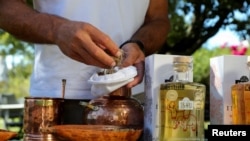Les Ansley has developed an unusual kind of gin - a clear alcoholic drink that is flavored with fruits and seeds.
Some of this gin's ingredients have passed through the digestive system of elephants.
Les Ansley gets some of the raw materials by going into the South African wilderness, finding elephant waste, smelling it, and then storing it in a bag to use when making the high-end alcohol.
The elephants do the work, finding the herbs and fruit that give the gin its taste, explained Ansley.
Launched in 2018, Indlovu gin - named after a local word for elephant - is sold in the United States, Canada, Germany, Switzerland, Japan and Taiwan.
Ansley and his wife Paula export about 1,500 bottles a month. Since the start of this year, two of South Africa's biggest sellers, Woolworths and Pick 'n' Pay carry it.
"The elephants, because they digest so little ... they have a very quick gut in-transit time, low gut bacteria, and very poor absorption," he told the Reuters news agency.
Ansley added, "they get to choose the best leaves and the best fruits and the best flowers and the best plants."
As well as the usual gin ingredients such as juniper and citrus, the dried and washed plant matter from the elephants change with the season and the climate. This gives different tastes to different batches. The date and location of the waste collection are given on the bottles produced, the distiller said.
The couple give 15 percent of the profits to an elephant orphanage - a place that cares for young elephants that have lost their parents. This is another reason that buyers might be interested in the product, besides its unusual nature.
But how does gin that is made from elephant waste taste?
Bartender Johanna Jones described it as “earthy.”
“That’s what makes it different,” Jones added.
I’m John Russell.
Sisipho Skweyiya reported on this story for Reuters. John Russell adapted it for Learning English.
________________________________________________________________
Words in This Story
ingredient –n. one of the things that are used to make a food, product, etc.
absorption – n. the act of taking in (something, such as a liquid) in a natural or gradual way
batch – n. an amount of something that is made at one time
distiller – n. a person or company that produces strong alcoholic drinks (such as whiskey) by distilling them






